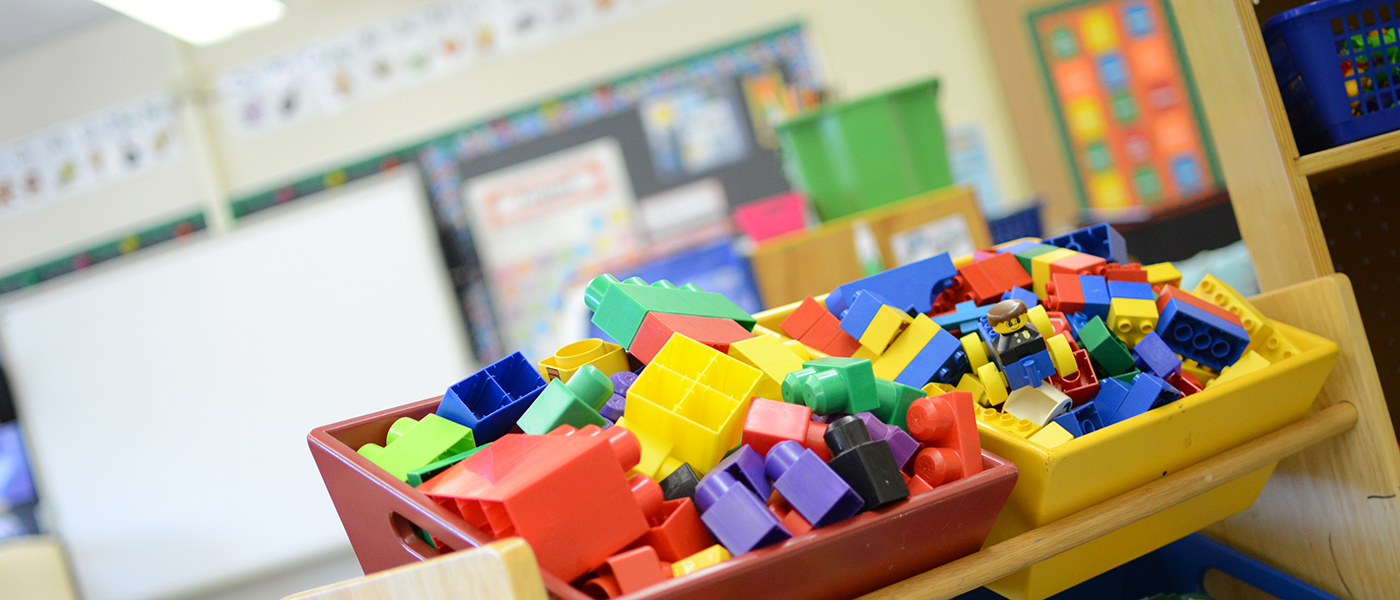Infants (6 Weeks to 12 Months)
Take a virtual tour of one of our infant classrooms.
The CDC publishes milestones for infants. How your child plays, learns, speaks, acts, and moves offers important clues about their development. Developmental milestones are things most children can do by a certain age. Check the milestones your child has reached.
Infants: 2 Months
Social and Emotional
- Begins to smile at people
- Can briefly calm herself (may bring hands to mouth and suck on hand)
- Tries to look at people
Language/Communication
- Coos, makes gurgling sounds
- Turns head toward sounds
Cognitive (Learning, Thinking, Problem-Solving)
- Pays attention to faces
- Begins to follow things with eyes and recognize people at a distance
- Begins to act bored (cries, fussy) if activity doesn’t change
Infants: 4 Months
Social and Emotional
- Smiles spontaneously, especially at people
- Likes to play with people and might cry when playing stops
- Copies some movements and facial expressions, like smiling or frowning
Language/Communication
- Begins to babble
- Babbles with expression and copies sounds he hears
- Cries in different ways to show hunger, pain, or being tired
Cognitive (Learning, Thinking, Problem-Solving)
- Lets you know if he is happy or sad
- Responds to affection
- Reaches for toy with one hand
- Uses hands and eyes together, such as seeing a toy and reaching for it
- Follows moving things with eyes from side to side
- Watches faces closely
- Recognizes familiar people and things at a distance
Movement/Physical Development
- Holds head steady, unsupported
- Pushes down on legs when feet are on a hard surface
- May be able to roll over from tummy to back
- Can hold a toy and shake it and swing at dangling toys
- Brings hands to mouth
- When lying on stomach, pushes up to elbows
Infants: 6-9 Months
Social and Emotional
- Knows familiar faces and begins to know if someone is a stranger
- Likes to play with others, especially parents
- Responds to other people’s emotions and often seems happy
- Likes to look at self in a mirror
Language/Communication
- Responds to sounds by making sounds
- Strings vowels together when babbling (“ah,” “eh,” “oh”) and likes taking turns with adult while making sounds
- Responds to own name
- Makes sounds to show joy and displeasure
- Begins to say consonant sounds (jabbering with “m,” “b”)
Cognitive (Learning, Thinking, Problem-Solving)
- Looks around at things nearby
- Brings things to mouth
- Shows curiosity about things and tries to get things that are out of reach
- Begins to pass things from one hand to the other
Movement/Physical Development
- Rolls over in both directions (front to back, back to front)
- Begins to sit without support
- When standing, supports weight on legs and might bounce
- Rocks back and forth, sometimes crawling backward before moving forward
Infants: 12 Months
Social and Emotional
- Is shy or nervous with strangers
- Cries when mom or dad leaves
- Has favorite things and people
- Shows fear in some situations
- Hands you a book when he wants to hear a story
- Repeats sounds or actions to get attention
- Puts out arm or leg to help with dressing
- Plays games such as “peek-a-boo” and “pat-a-cake”
Language/Communication
- Responds to simple spoken requests
- Uses simple gestures, like shaking head “no” or waving “bye-bye”
- Makes sounds with changes in tone (sounds more like speech)
- Says “mama” and “dada” and exclamations like “uh-oh!”
- Tries to say words you say
Cognitive (Learning, Thinking, Problem-Solving)
- Explores things in different ways, like shaking, banging, throwing
- Finds hidden things easily
- Looks at the right picture or thing when it’s named
- Copies gestures
- Starts to use things correctly; for example, drinks from a cup, brushes hair
- Bangs two things together
- Puts things in a container, takes things out of a container
- Lets things go without help
- Pokes with index (pointer) finger
- Follows simple directions like “pick up the toy”
Movement/Physical Development
- Gets to a sitting position without help
- Pulls up to stand, walks holding on to furniture (“cruising”)
- May take a few steps without holding on
- May stand alone


